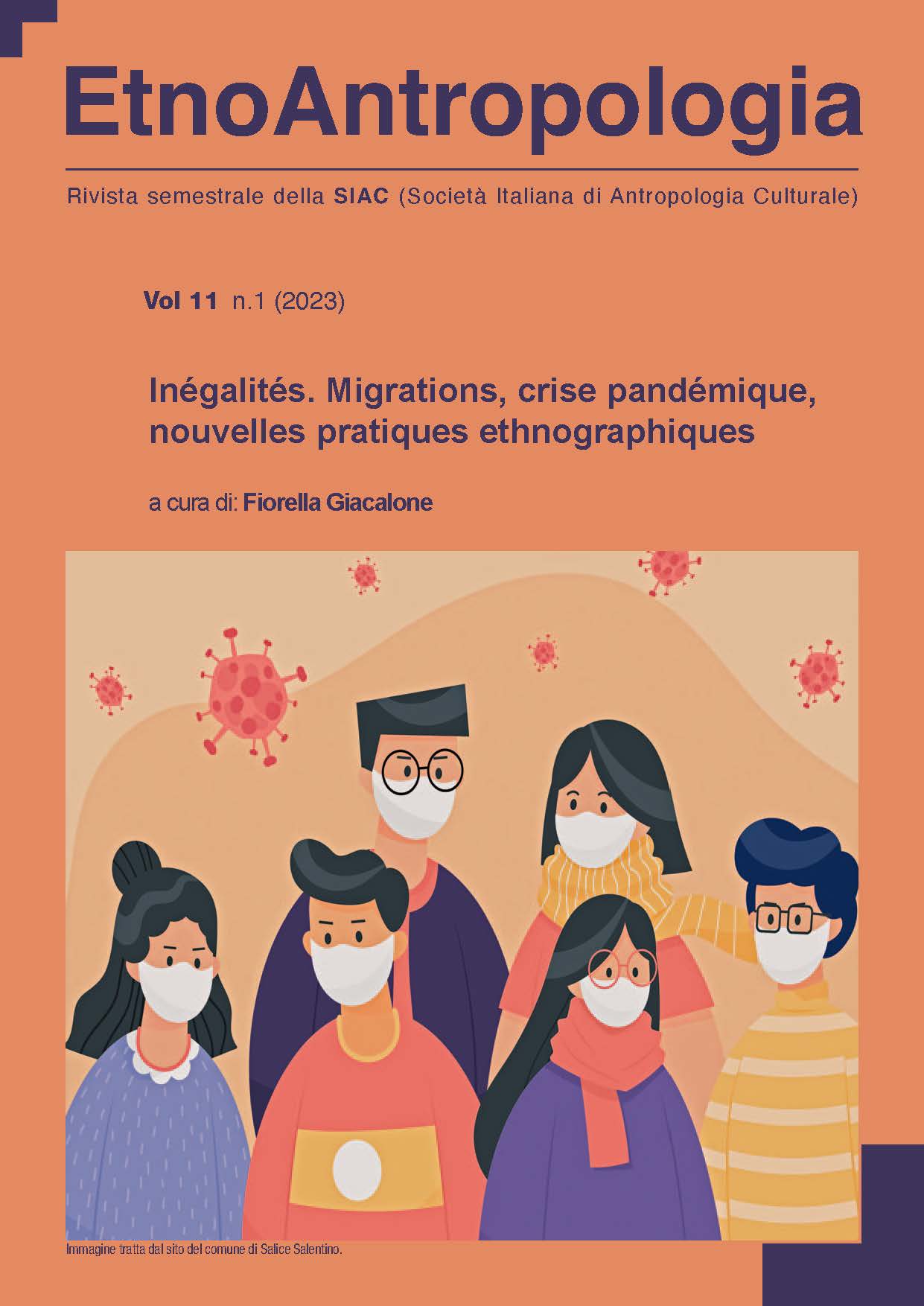Quand il n’y a plus de concerts… Les musiciens de l’ensemble Orpheus XXI (Jordi Savall) en temps de pandémie1 When there are no more concerts... The musicians of the Orpheus XXI ensemble (Jordi Savall) in times of pandemic
Parole chiave:
Musicians, migrations, institutions, uncertainty, pandemicAbstract
In the context of the pandemic, the absence of a concert serves as a heuristic tool to see what migrant musicians of the orchestra Orpheus XXI (Jordi Savall) in France and Germany do during this time. The lack of concerts impacts their economic income, their daily and family lives, and reduce the practice of their profession as musicians; they develop strategies to compensate this lack. The pandemic also exposes and reinforces inequalities in economic and professional status between musicians.
Riferimenti bibliografici
Abélès, M. 1995, Pour une anthropologie des institutions, «L’Homme», 35 (135), 65-85.
Arfaoui M. 2019, «Creative Europe» ou l’action publique par projets. Enquête sur une modernisation des politiques publiques en Europe, École des Hautes Études en Sciences Sociales.
Aull Davies C. 1999, Reflexive Ethnography. A Guide to Researching Selves and Others, London: Routledge.
Barou J., Baussant M. 2011, Les Migrations, «Ethnologie française, 40 ans», Paris: Presses Universitaires de France, 376-380.
Becker H.S. 1988 (1982), Les Mondes de l’art, Paris: Flammarion (I ed. 1965).
Bennett A., Cashman D., Green B., Lewandowski N. (eds.) 2023, Popular Music Scenes. Re¬gional and Rural Perspectives, Cham: Palgrave Macmillan.
Bensignor F. 2018, Orpheus XXI. Musique pour la vie et la dignité, «Hommes & Migrations», 4 (1323), 200-204.
Blacking J. 1973, How Musical is Man? Seattle: University of Washington Press.
Blanchard E., Rodier C. 2016, «Crise migratoire»: ce que cachent les mots, «Plein Droit», 111 (4), 3-6.
Bratus A., Caliandro A., Caruso F., Ceravolo F. A., Garda M. 2023, Musical Performance during and after the COVID-19 Pandemic: Days of Future Passed? In Agamennone M., Palma D., Sarno G. (eds.) 2023, Sounds of the Pandemic Accounts, Experiences, Perspectives in Times of COVID-19, Oxon/New York: Routledge.
Bureau M.-C., Perrenoud M., Shapiro R. (eds.) 2009, L’Artiste pluriel. Démultiplier les activités pour vivre de son art, Lille: Presses Universitaires du Septentrion.
Chateauraynaud F. 1999, Les Relations d’emprise. Une pragmatique des asymétries de prises, document de travail, en ligne: http://gspr.ehess.free.fr/documents/FC-Emprise.pdf.
De Certeau M. 1990, L’Invention du quotidien. 1. Arts de faire, Paris: Gallimard.
Dewey J. 1980 (1934), Art as Experience, New York: Perigee Books.
Dousset L. 2018 Pour une Anthropologie de l’incertitude, Paris: CNRS Éditions.
Ethis E., Fabiani J.-L., Malinas D. (eds.) 2008, Avignon ou le public participant. Une sociologie du spectateur réinventé, Montpellier: Entretemps.
Favret Saada J. 1977, Les Mots, la mort, les sorts, Paris: Gallimard.
Gray P.A. 2016, Memory, Body, and the Online Researcher. Following Russian Street Demon¬strations via Social Media, «American Ethnologist», 43 (3): 500-510.
Hahn H.P. 2016, Kann Universalität spezifisch sein? Aneignung, Hybridisierung, Bricolage, «Projekt Bauhaus», https://www.youtube.com/watch?v=Qs_lrD+WnSR.
Hahn H.P., Neumann F. (eds.) 2019, Das neue Zuhause. Haushalt und Alltag nach der Migra¬tion, Frankfurt-am-Main: Campus.
Héran F. 2017, Avec l’Immigration. Mesurer, débattre, agir, Paris: La Découverte.
Hockey J, Forsey M. 2012, Ethnography is not Participant Observation. Reflections on the Interview as Participatory Qualitative Research, In Skinner J. 2012, The Interview: An Eth¬nographic Approach, London: Routledge, 69-88.
Joas H. 1992, Die Kreativität des Handelns, Frankfurt am Main: Suhrkamp.
Kusenbach M. 2003, Street Phenomenology: The Go-Along as Ethnographic Research Tool, «Ethnography», 4 (3), 455-485.
Laborde D. 1999, Enquête sur l’improvisation, in De Fornel M., Quéré L. (eds.) 1999, La Lo¬gique des situations, Paris: Éditions de l’EHESS, 261-299.
– 2014, Méthodologie de l’enquête et ontologies musiciennes, «Cahiers d’ethnomusicolo¬gie», 27, 117-132.
– 2019. Préface, «Cahiers d’ethnomusicologie», 32, 9-21.
Laborde D., Ramel F. 2020, Avec Frédéric Ramel. Un musicien peut-il adoucir les relations internationales? «Gradhiva», 31, 113-127.
Lendaro A., Rodier C., Vertongen Y.L. (eds.) 2019, La crise de l’accueil. Frontières, droits, résistances, Paris: La Découverte.
Letourneux F., Schütz G. (eds.) 2023, Remote Work: From Employee Telework to Self-Employed Home-Based Work? In Zimmermann B., Herzog L. 2023, Shifting Categories of Work. Un¬settling the Ways We Think about Jobs, Labor, and Activities, New York/Oxon: Routledge, 46-58.
Menger P.M. 2009a, L’Art analysé comme travail, «Idées économiques et sociales», 158 (4), 23-29.
– 2009b. Le Travail créateur. S’accomplir dans l’incertain, Paris: Seuil/Gallimard.
Merriam A.P. 1964, The Anthropology of Music, Evanston: Northwestern University Press.
Passeron J.C., Revel J. (eds.) 2005, Penser par cas, Paris: Éditions de l’EHESS.
Perrenoud M. 2009, Formes de la démultiplication chez les «musicos», In Bureau M.-C., Perre¬noud M., Shapiro R. (eds.) 2009, L’Artiste pluriel. Démultiplier les activités pour vivre de son art, Lille: Presses Universitaires du Septentrion, 83-94.
Quéré L. 1997, La Situation toujours négligée? «Réseaux», 15 (85), 163-192.
Quéré L. 1999, Action située et perception du sens, in De Fornel M., Quéré L. (eds.) 1999, La Logique des situations, Paris: Éditions de l’EHESS, 301-338.
Spradley J. 1979, The Ethnographic Interview, New York: Holt, Rinehart & Winston.
Walton S. 2020, Social Distancing vs. Digital Social Participation in Milan. Notes from Field¬work and After, «University College London», <https://blogs.ucl.ac.uk/assa/2020/03/23/ social-distancing-vs-digital-social-participation-in-milan-notes-from-fieldwork-and-after/>.
Pubblicato
Come citare
Fascicolo
Sezione
Licenza
Copyright (c) 2023 Alicia Vogt

TQuesto lavoro è fornito con la licenza Creative Commons Attribuzione 4.0 Internazionale.
Gli autori mantengono i diritti sulla loro opera e cedono alla rivista il diritto di prima pubblicazione dell'opera, contemporaneamente licenziata sotto una Licenza Creative Commons - Attribuzione che permette ad altri di condividere l'opera indicando la paternità intellettuale e la prima pubblicazione su questa rivista.
Gli autori possono diffondere la loro opera online (es. in repository istituzionali o nel loro sito web) prima e durante il processo di submission, poiché può portare a scambi produttivi e aumentare le citazioni dell'opera pubblicata (Vedi The Effect of Open Access).





